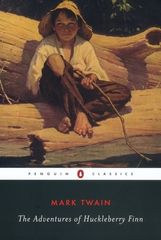The Adventures of Huckleberry Finn


Mark Twain's The Adventures of Huckleberry Finn is a classic American novel that follows the journey of a young boy named Huck Finn as he escapes his abusive father and embarks on a series of adventures with an escaped slave named Jim.
The novel is set in the 19th century in the Mississippi River valley, and it explores themes of race, class, and morality in the American South. Huck Finn is a young boy who has been raised by his alcoholic and abusive father, and he longs to escape his life of poverty and misery. When his father kidnaps him and takes him to a remote cabin, Huck decides to escape and fakes his own death to avoid being found.
Huck then meets Jim, an escaped slave who is seeking his freedom. Together, the two set out on a raft down the Mississippi River, encountering a variety of characters and adventures along the way. As they journey together, Huck begins to question the morality of slavery and the society that condones it. He also grapples with his own conscience as he considers whether to turn Jim in or to help him reach freedom.
The Adventures of Huckleberry Finn is a powerful critique of the social and moral values of the American South in the 19th century. The novel's portrayal of slavery and racism is unflinching, and it exposes the brutality and inhumanity of the institution. The novel also challenges traditional notions of morality and civilization, as Huck struggles to reconcile his own sense of right and wrong with the values of the society around him.
One of the most notable aspects of the novel is its use of dialect and vernacular language. Twain's use of regional dialects and colloquial language gives the novel a sense of authenticity and realism, and it also adds humor and depth to the characters. Huck's own voice is especially distinctive, as he speaks in a rough and uneducated manner that reflects his upbringing and his rejection of societal norms.
Another notable aspect of the novel is its depiction of the natural world. As Huck and Jim travel down the Mississippi River, they encounter a variety of natural wonders and dangers, from storms and rapids to the beauty of the river itself. The natural world is a source of both comfort and danger for the characters, and it serves as a metaphor for the larger journey they are on.
In conclusion, The Adventures of Huckleberry Finn is a classic novel that continues to be widely read and celebrated today. Its powerful critique of slavery and racism, its complex and realistic characters, and its vivid portrayal of the natural world make it a masterpiece of American literature. While some readers may find the novel's use of dialect and its portrayal of race and slavery to be challenging, it is ultimately a powerful and important work that deserves to be read and studied by all who are interested in American history and culture.